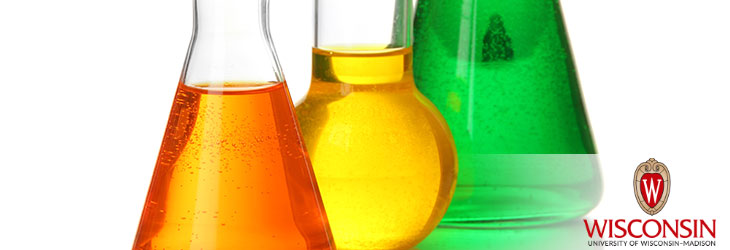Materials & Chemicals

Converting Biomass-Derived Carbohydrates to High-Quality, Long-Chain Liquid Fuels
WARF: P06037US
Inventors: James Dumesic, George Huber, Juben Chheda, Christopher Barrett
The Wisconsin Alumni Research Foundation (WARF) is seeking commercial partners interested in developing a practical and energy-efficient catalytic process for producing high-quality, long-chain liquid fuels from carbohydrates.
Overview
Alkanes produced from carbohydrates could provide a renewable source of transportation fuel to complement the rapidly growing production of bio-diesel from vegetable oils and animal fats.
The Invention
UW-Madison researchers have developed a practical and energy-efficient catalytic process for producing high-quality, long-chain liquid fuels from carbohydrates. The multi-stage process uses combinations of self- and crossed-aldol condensation reactions, dehydration reactions and hydrogenation reactions to yield alkane, alkene and ether products.
Preferably, this process starts with an acid-catalyzed dehydration of biomass-derived carbohydrates. Then an aqueous-phase aldol condensation reaction yields large organic compounds, which are converted into long-chain alkanes via dehydration and/or hydrogenation. The aldol condensation reaction takes place in the presence of a stable, recyclable and solid-base catalyst, which is comprised of magnesium, zirconium, oxygen and possibly palladium.
Preferably, this process starts with an acid-catalyzed dehydration of biomass-derived carbohydrates. Then an aqueous-phase aldol condensation reaction yields large organic compounds, which are converted into long-chain alkanes via dehydration and/or hydrogenation. The aldol condensation reaction takes place in the presence of a stable, recyclable and solid-base catalyst, which is comprised of magnesium, zirconium, oxygen and possibly palladium.
Applications
- Biofuel production
- Production of useful feedstocks for making organic chemicals
Key Benefits
- Alkanes can be used as sulfur-free fuel components
- Aldol condensation reactions occur in the aqueous phase, enabling the generation of alkanes from renewable resources
- Unlike the conversion of glucose to ethanol, this reaction does not require an energy-intensive distillation step—alkanes spontaneously separate from the aqueous solvent
- Environmentally friendly
- Catalyst maintains significant activity after recycling and is potentially useful in other aqueous-phase catalyzed reactions
- Reactions are appropriate for many types of reactors, including batch, semi-batch and continuous flow reactors
Additional Information
For More Information About the Inventors
Tech Fields
For current licensing status, please contact Jennifer Gottwald at [javascript protected email address] or 608-960-9854